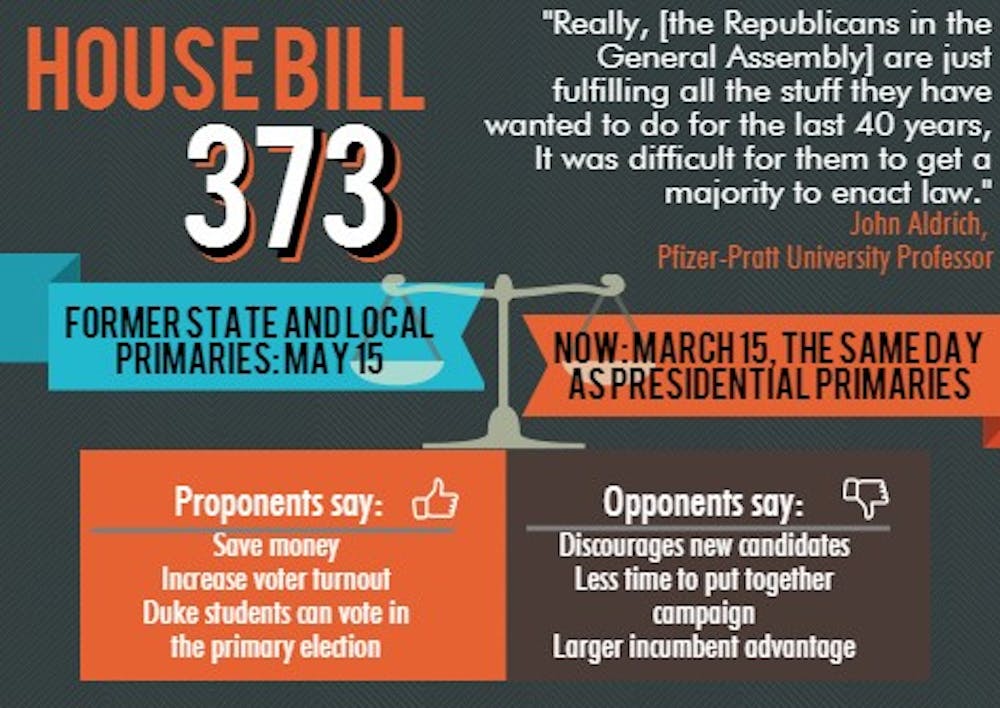North Carolina’s primary election date will move to March, thanks to a new bill signed into law by Governor Pat McCrory last week.
House Bill 373 shifts the date of North Carolina state and local primaries two months earlier—to March 15 from May 15, which is the same day as presidential primaries. Republicans, who formed the majority of support for the bill, have cited economic efficiency and the potential for increased voter turnout in local elections as benefits. Critics say, however, that the legislation gives incumbents an advantage and makes it harder for new candidates to run.
“Putting all of the other primaries on March 15 does save a lot of money,” John Aldrich, Pfizer-Pratt University professor of political science, said. “It costs millions of dollars to run statewide elections, even if they are primaries.”
He noted that the increased turnout supporters cite as a benefit may help some parties more than others, depending on which has a competitive presidential primary.
Despite the money it saves, critics say the bill disadvantages new candidates, who might find it hard to get their message out with two months fewer to campaign.
“Candidates have to decide very quickly now whether they have the means, the resources, the relationships, the organizational structure to run,” said George Eppsteiner, a staff attorney at the Southern Coalition for Social Justice. “That may deter qualified candidates from running, which would dilute the quality of the elections pool.”
Another concern is the difficulty new candidates may face with the increased amount of time between primaries and the general election.
“[The increased time] can be a problem to make decisions—how they are going to fill up this time and what the nature of the campaign is going to be,” Aldrich said. “This advantages incumbents compared to challengers from outside of incumbency.”
David Rohde, Ernestine Friedl professor of political science, said, however, that he is not convinced the increased time between primaries and elections will have a significant negative impact on new candidates. He explained that it is already very difficult for new candidates to challenge incumbents.
The change will also allow Duke students, who leave in early May, to vote in person in the primary election. Previously, with state and local primaries in mid-May, students who left campus for summer break would have had to request absentee ballots to vote in the state-wide primary.
“May is busier and depending on exactly when the primary is, students may be away from campus,” Rohde said. “I suppose that in that sense, it might be a little easier in March.”
This legislation is part of a larger array of changes to voting policy in North Carolina. In 2013, the presidential primaries were moved to March. Eppsteiner said that this move was an opportunity for North Carolinians to have a greater voice in choosing the presidential candidates for the general election.
In the same year, the North Carolina General Assembly passed legislation that required photo ID for voting, shortened the early voting period by a week, removed same day registration during the early voting period and eliminated the ability for 16 and 17 years-olds to pre-register, among other provisions. This legislation has led to legal action against the state due to claims that these increased requirements are attempts to suppress turnout from African Americans and other minority voters.
Aldrich noted that the primary law is among the changes Republicans in the state legislature have historically advocated for.
“Really, [the Republicans in the General Assembly] are just fulfilling all the stuff they have wanted to do for the last 40 years,” Aldrich said. “It’s happening now because of the build up of desires over many years and obviously, to try to implant themselves more firmly in power through the use of electoral rules.”
Class of 2019
Editor-in-chief 2017-18,
Local and national news department head 2016-17
Born in Hyderabad, India, Likhitha Butchireddygari moved to Baltimore at a young age. She is pursuing a Program II major entitled "Digital Democracy and Data" about the future of the American democracy.

